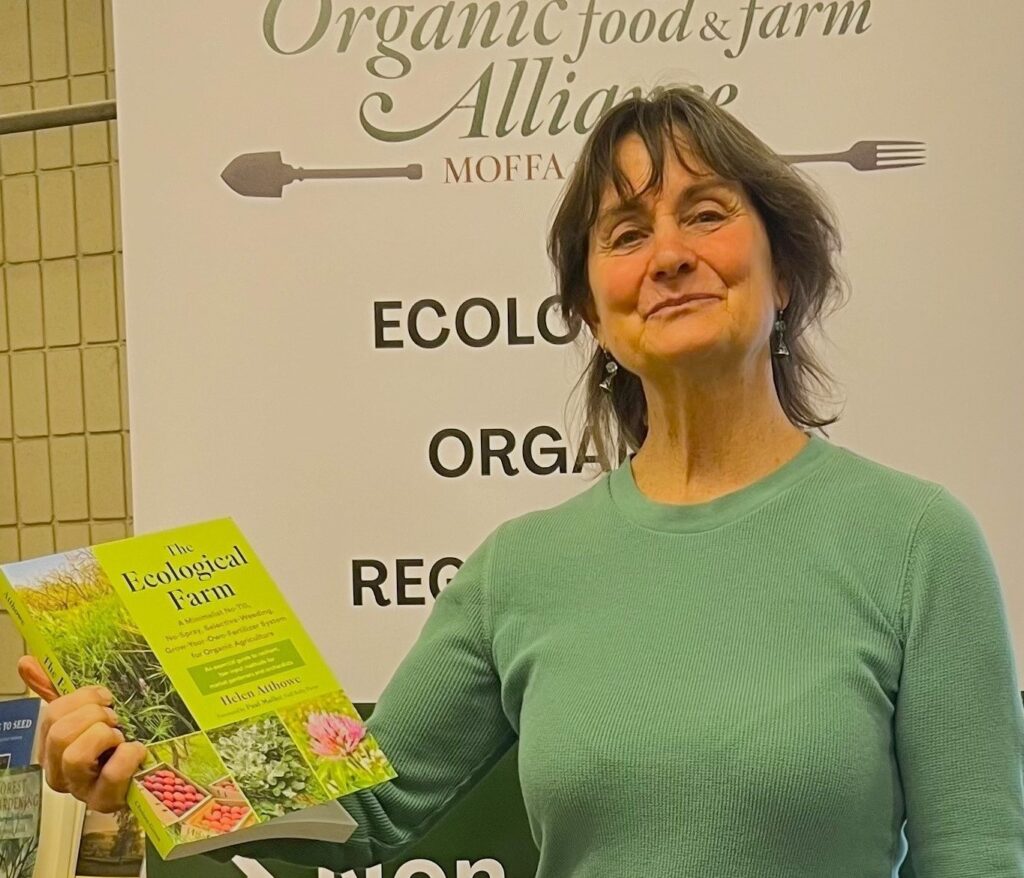Longtime farmer and researcher Helen Atthowe discusses the possibilities and challenges of taking the established principles of eco-agriculture and making them work in commercial vegetable and fruit production
Acres U.S.A. You mentioned in an email that you had an experience recently at a conference where some extension agents were talking about organic research, and you realized that they were about 20 years behind in the type of information they were presenting growers. We feel that way a little bit too here at Acres U.S.A. — Charles Walters started talking about ecological methods of farming 50 years ago, and for a long time very few other publications were talking about it, and now all of a sudden everyone’s talking about regenerative. This is of course great — but then also it feels like people don’t quite understand the whole-systems aspect of it, and there’s a lot of fluff out there.
Helen Atthowe. Yes! I was an extension horticulture agent myself for 17 years, ending in 2009. It’s wonderful that there is more interest in organic methods now, where before we had to fight to use the “O” word! However, now we’re using the same words, but it’s not a deep dive into ecological or, let’s face it, organic. Now we have a big umbrella over which we have the term “organic,” and some of it is barely organic — while some of it is moving well into ecological farming, I think.

Acres U.S.A. Right. You don’t want to be persnickety, and you want to welcome people openly into the fold, but you want to encourage them to keep moving more in the ecological direction. How do you do that — how do you help folks like these researchers move from level A to level D or E or F — whatever level you and other Acres U.S.A.-type farmers are at?
Atthowe. I think talking about soil health and microbial communities is a point of common ground because I think the science has caught up with what we thought 50 years ago. I think that’s exciting.
But I don’t think we’ve figured out how to practically go from where the science is to what our methods are. We talk about reduced tillage, we talk about keeping a living root in the ground, and I think those are key and are a place of common ground. But I don’t think we understand how to make that happen — how to manage plant competition when you leave a growing root in the ground, how to deal with high residues as a big part, if not the total, of your soil fertility system. I think we haven’t addressed that, and we certainly don’t have as much of a research agenda around it as I would like to see.
Acres U.S.A. I think that’s true. Could we go back and describe your background? You worked with Masanobu Fukoaka and Wes Jackson — you’ve got this unique history in agroecology.
Atthowe. I’ve been really lucky. I started out before I even knew better. I grew up in Montana around conventional farming. Actually, it was mostly organic, because people didn’t have money to use the chemicals.
And then I managed to drop out of college for the first time, and I discovered Masanobu Fukoaka, who focused on all the things we’re talking about — a living root in the soil all the time, reduced tillage or no tillage, and growing your own fertilizers. I spent a lot of the next 40 years trying to figure out how to make it happen on commercial vegetable and fruit farms in the United States.
I knew it was something important. It certainly wasn’t the way we grew grain in Montana. It inspired me to go back to college, finish up, and go to graduate school, and then I got a year’s internship at the Land Institute. Wes Jackson just opened my whole focus there. It was a deep dive into ecological components of an agricultural system that would mimic nature. I’ve been trying to do that in my commercial horticulture pursuits for the past 40 years.
Wes was a great thinker who inspired me and gave me readings — every morning we would argue about the readings with him and the other students who were there. And then in the afternoon we all had our experiments in the field. I can’t emphasize how important those readings were in opening me up to thinking differently. I had a different paradigm, and I was asking questions differently.
Acres U.S.A. What were some of those readings? Aldo Leopold, Sir Albert Howard…?
Support authors and subscribe to content
This is premium stuff. Subscribe to read the entire article.

















